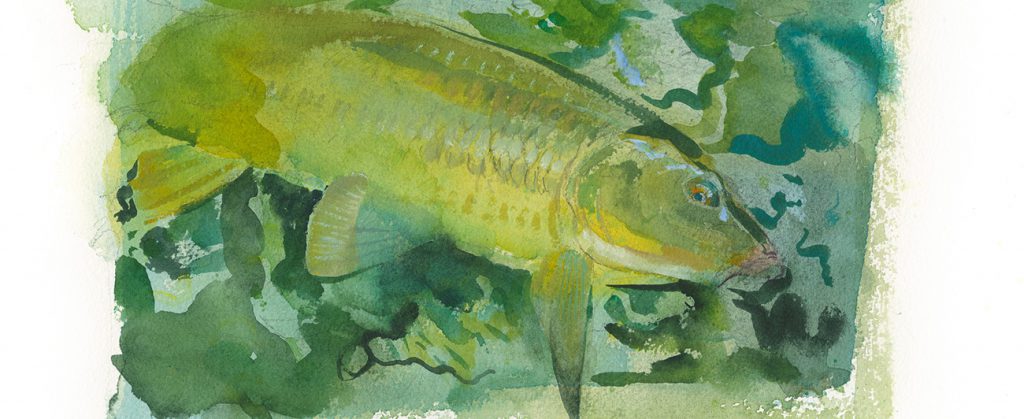Reviewed by Isaac Fox

James Wu’s essay “The Queen of Central Park”—published in Volume 13, Issue 3 of The Flyfish Journal—searches for the beauty in contradiction. Wu’s quest is for wildness in the heart of New York City, for elegance in a creature that gleefully eats garbage, for peace in the bleakest months of a global pandemic. His quest feels impossible, but so did most other things in Spring 2020.
In an essay focused on escapism, Wu begins en media res, mid-escape. Flyfishing in Central Park, he hooks the titular monarch, which is “enormous, an aged creature from a long time ago,” a carp so huge that “[all] the other carp got out of her way and kissed her ass.” In this scene, and throughout the essay, Wu’s language dodges back and forth between poetic elegance and absurd, even crass passages. These rapid tonal shifts occasionally feel jarring, but they perfectly capture the (even more jarring) duality of communing with nature in a place irrevocably changed by urban development. This desire to seek wonder wherever possible, and this half-absurdist, half-elegant tone, are amplified by Frederick Stivers’ accompanying artwork. Vibrant cityscapes and carp-y forms sprawl across discarded paper bags, a vinyl dust jacket, and even an Angel Soft toilet-paper wrapper.
The essay’s several action scenes—beginning with the opening salvo between Wu and the Queen—capture a similar duality. They are extremely tense (at least for the fishermen in the audience), with their rapidfire descriptions of the back and forth between predator and prey; at the same time, however, they are appropriately absurd. While fighting the fish, Wu and his friend, who is manning the net, constantly struggle to avoid falling into the disgusting NYC water. Later on, after explaining every flyfisherman’s endless conundrum over whether or not to grab the leader while landing a big fish—which, of course, makes the action feel even more intense—Wu suddenly backs off. “This matters only subjectively,” he writes. “It’s only a fish.”
This sudden reminder that none of this is actually important drives home just how much a hobby like fishing can sometimes feel like the most important thing in the world. This is what gives our pastimes the power to set us free from concerns that really are important. And—like most of us—in Spring 2020, Wu needed some escapism in his life.
The en-media-res opening ends with Wu’s fishing buddy, J.R., coming to his side, armed with a little trout net. “‘This net’s too small,’ he says. ‘But it’s all I have.’”
And then pagebreak. Whitespace. A step back from escapism, and into reality.
At first, Wu’s descriptions of the pandemic focus on his early plans to fish through it. The tone is, at this point, almost flippant. “Sure, I was worried about the virus and the economy,” he writes, “but I was also anticipating the crab hatch in the sand in the Atlantic.” But then, a woman Wu has just started dating catches COVID and survives, but is left with a lingering lung condition. “For a brief period,” Wu writes, just a couple sentences later, “I noticed refrigerated trailers whirring quietly outside the hospitals and then there was one trailer, parked, rattling, around the corner from my apartment, in front of the funeral parlor.”
Suddenly, this is real, to Wu and to us. Everyone reading this lived through the pandemic, of course, and most readers probably have some idea of its severity in NYC. But this line still makes it real to the essay in a way it wasn’t before. When Wu returns to his battle with the Queen, it feels like a lot more than a fishing trip. With these bleak details in the background, his quest for escapism becomes something urgent, even desperate.
Like Wu, I spent the Spring of 2020 trying to disappear into a pondbank, to wade creeks until my anxiety dissolved and drifted away with the current. It worked, but only in short bursts, and only when I was actively fishing. Wu’s essay captures this truth, too: the escapism happens only at the park, and even there, reminders of the pandemic creep in at times. At home, the situation feels a lot more stark.
“The Queen of Central Park” was published in Spring 2022. In the nearly two years since then, the depths of the pandemic have started to feel more distant. Not that COVID-19 is done killing us, by any means, but its initial surge is beginning to shift from recent memory into public and personal history.
Even though Wu’s essay was published within the last two years, it already feels like a snapshot of an earlier time. Reading it can, momentarily, take you back to the walled-in psychology of 2020’s mass quarantine. But above all, “The Queen of Central Park” is a bittersweet reminder of the blissful moments when our emotionally exhausted minds found relief. By beginning and ending this essay in the midst of a successful (if brief) escape from reality, Wu shines a beacon of hope out from the depths of the pandemic.
Isaac Fox plays the clarinet and guitar, and spends as much time as possible outside. His work has appeared in Bending Genres, Tiny Molecules, and A Velvet Giant, among other publications. Isaac is a co-editor of Shelf Fungus Press, along with Abbie Hoffer. You can find him on Twitter at @isaac_k_fox.


